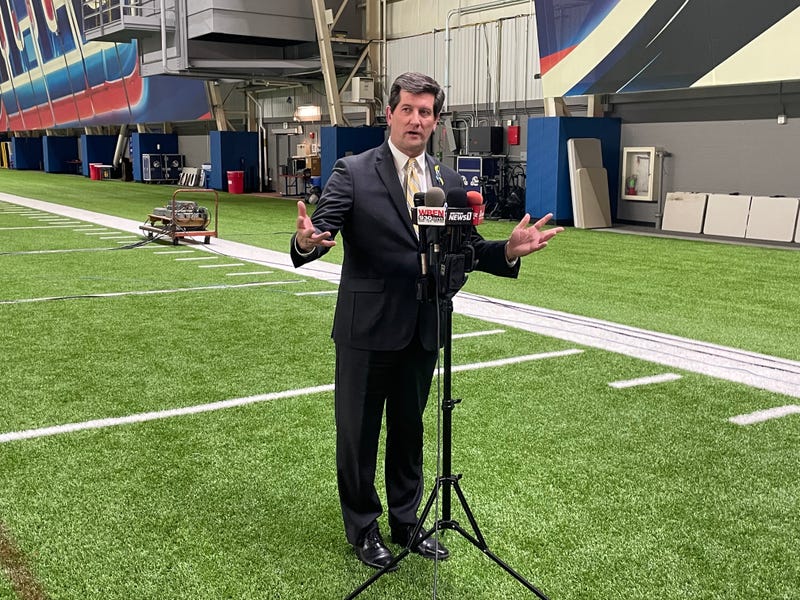
Orchard Park, N.Y. (WBEN) - "Nothing brings our community quite together like the Buffalo Bills. It doesn't matter where you live, your age or political persuasion, we all bleed Bills red, white and blue."
During Erie County Executive Mark Poloncarz's "State of the County" address at the ADPRO Sports Training Center in Orchard Park on Thursday, the new Bills stadium deal was a big talking point towards the end of his 45-minute long address.
It was a week-and-a-half ago when Erie County came to an agreement, along with New York State, the Bills and the National Football League, on a new deal for the construction of a new stadium in Orchard Park. Not only does the agreement give the Bills a new home to replace the outdated Highmark Stadium, but it also ensures the long-term future of the team in Western New York with the addition of a 30-year lease.

"When construction is completed, the Bills will call the new stadium home for at least 30 years, until 2055," Poloncarz said.
Overall, the construction cost of the new stadium in Orchard Park will run around $1.4 billion, with $850 million of that money being funded from the State and County level. Erie County is set to contribute $250 million of that cost, while New York State will contribute the remaining $600 million of the publicly funded money.
Over the past several years, it has been the County that has owned and operated Highmark Stadium while the Bills called the facility home. Once the new stadium is constructed and the Bills have moved operations across Abbott Road, that will free up Erie County from the football business.
This has many in Erie County government, including Poloncarz, very happy that their one-time investment in the Bills stadium will not only keep the team in Western New York, but save the County money down the road.
"The County will be contributing $250 million towards construction, but then nothing more going forward - a key term I fought hard to get," Poloncarz explained. "Erie County will no longer be in the football business, because we will no longer be directly subsidizing the team annually, thereby saving 10s of millions of dollars in the long run.
"Just this year alone, Erie County is paying about $7 million to the Buffalo Bills for operating gameday expenses. So theoretically, we help pay for the chain gang that works, the workers, as well as capital. Then we have another $250,000 or so that goes just for insurance purposes, because we own the facility. We will no longer own the facility, which means we no longer have an obligation to keep that insurance. We will no longer have an obligation annually with regards to capital upkeep."
Overall, the investment of money from the State and County makes up 60.7% of the projected $1.4 billion stadium. Where Poloncarz made sure to ensure the stadium was a fair deal for people of the region is that if the stadium cost goes up over time, that extra cost does not get directed towards the community. That's because the Bills are then on the hook for any cost overrun for the new stadium.
"When the Vegas stadium [Allegiant Stadium] was being built, the governments were on the hook for about 60% of the cost. In the end, it was about 45% of the cost. Why? Because the Raiders were responsible for cost overruns," Poloncarz said. "I hope that construction gets done on time and on budget. If it doesn't, not my worry. It's not the state's worry. And when other smaller markets are paying over 70% of the cost for new construction and we're paying 60.7%, that's a fair deal."
Poloncarz felt it was so important to not only get a fair deal done and in place for the community, but also to keep an integral part of the fabric of Western New York in place. He knows, just as much as any Bills fan or football fan in the region, how important the team is to the community any given season.
"The team is ingrained in our hearts and our souls. However, the modern NFL is one where there is no guarantee a team will stay in its current location," Poloncarz said. "Since I negotiated the last lease extension in 2013, three teams have moved to new markets. San Diego and St. Louis to Los Angeles, and Oakland to Las Vegas. Our population is growing, and our community and the county is strong. Losing the Bills would be a huge psychological and economic blow to our region. That is why it was so important to negotiate an agreement that kept the team here, but was also fair to the people of Erie County. That is exactly what we did."
While many local delegates understood the importance of getting a new stadium deal done for the Bills and the local community, many others around the State may not have been so understanding.
There were fears going into the final days of stadium negotiations that members of the State Legislature would not be in favor of the Bills stadium deal being a part of the State budget. That there would be enough backlash about that Bills stadium deal that the deal would potentially be struck down just before it took off.
Thankfully, a “conceptual” agreement of the budget was announced by Gov. Kathy Hochul on Thursday, which included her plan to earmark $600 million in state funds to help the construction of the new stadium. A large portion of the state's funding for the stadium will come from funds paid by the Seneca Nation to New York State, as part of a deal on casino revenues, according to Gov. Hochul.
"This is important. We are one state," Poloncarz said after talking about an interview he recently had with a New York City radio station on the Bills stadium. "We have to understand that there's money that's invested by New York State that the people of Western New York will never see the benefit from. But there's also money that is invested in our community that we will benefit from that people in Brooklyn, Queens, Riverhead on Long Island will never see the benefit of. Maybe. Maybe they come to a Bills game someday."
Poloncarz believes this stadium deal has to be looked at as a one-time only investment to ensure the long-term viability of the Bills in Buffalo. If there had been no action taken with the stadium and a new deal soon, he seriously felt the team was bound for another market.
"I believe the team would have moved unless we got a fair agreement," he said. "I'm really thankful the Pegulas are investing in this community, but if we didn't invest, I think they would have moved."
Another key player in this stadium deal was Gov. Hochul and her large investment in her hometown team. Poloncarz was sure to throw the credit her way for making the investment she made to keep the Bills in Western New York.
"We have a tremendous advocate in the Governor's office in our own Gov. Kathy Hochul," Poloncarz said. "We've had lots of calls during this whole period, lots of discussions through the negotiations, and I spoke to her about half hour before I walked out here today to talk about the budget. She said, 'Mark, the money is in the budget. We're going to get it done, and now it's on the county to do its part.' I know it will."
Poloncarz also backed Gov. Hochul when it came to the stadium deal impacting her attempted run at being voted back into office as Governor of New York. He believes that the stadium deal will have no impact on her chances to win the people's vote, and she will become the first Buffalo-born Governor voted into office since the 1800s.
While the work is far from over to finalize the stadium deal and get shovels into the ground for construction, Poloncarz feels that toughest work is now done, and it's about moving forward with a bright future ahead for not only the Bills, but all of Erie County.
"Where other communities failed to come together to keep their teams, we rolled up our sleeves and worked hard to reach an equitable agreement that is good for our community," he said. "In a time of divisive government, where it seems nothing gets accomplished, we proved we could work together to get a complicated agreement negotiated. We did our part, now it's up to Josh Allen and the rest of the team to win that Super Bowl. No pressure!"

